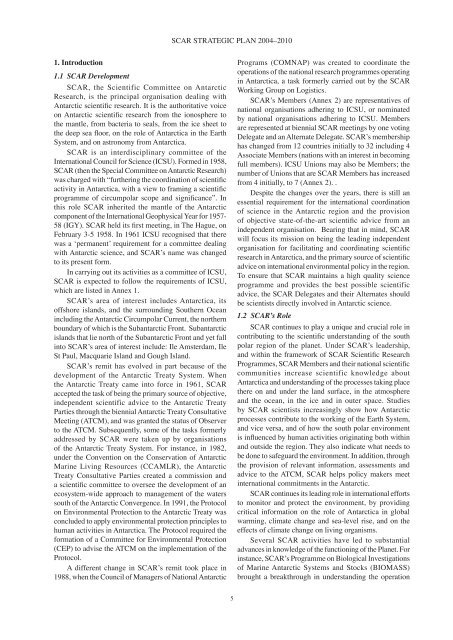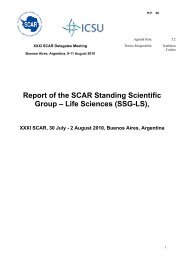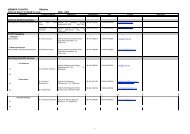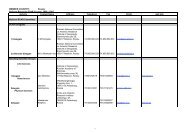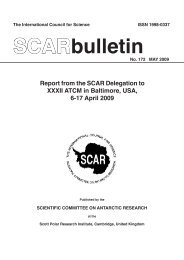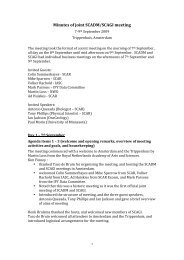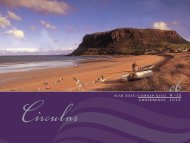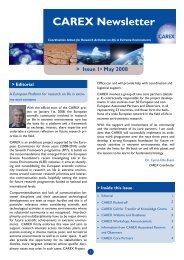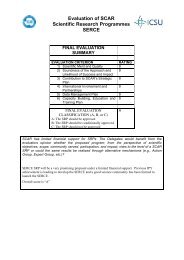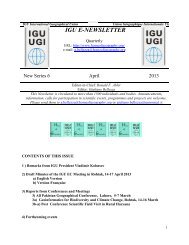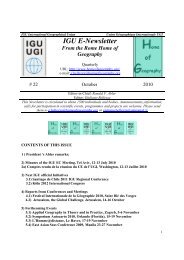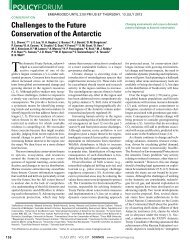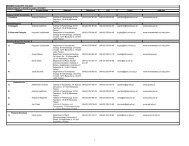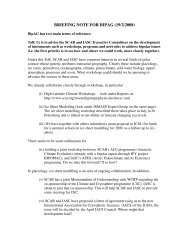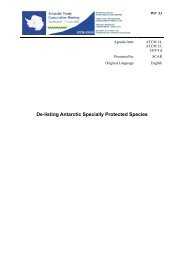SCAR Strategic Plan - Scientific Committee on Antarctic Research
SCAR Strategic Plan - Scientific Committee on Antarctic Research
SCAR Strategic Plan - Scientific Committee on Antarctic Research
You also want an ePaper? Increase the reach of your titles
YUMPU automatically turns print PDFs into web optimized ePapers that Google loves.
<str<strong>on</strong>g>SCAR</str<strong>on</strong>g> STRATEGIC PLAN 2004–2010<br />
1. Introducti<strong>on</strong><br />
1.1 <str<strong>on</strong>g>SCAR</str<strong>on</strong>g> Development<br />
<str<strong>on</strong>g>SCAR</str<strong>on</strong>g>, the <str<strong>on</strong>g>Scientific</str<strong>on</strong>g> <str<strong>on</strong>g>Committee</str<strong>on</strong>g> <strong>on</strong> <strong>Antarctic</strong><br />
<strong>Research</strong>, is the principal organisati<strong>on</strong> dealing with<br />
<strong>Antarctic</strong> scientific research. It is the authoritative voice<br />
<strong>on</strong> <strong>Antarctic</strong> scientific research from the i<strong>on</strong>osphere to<br />
the mantle, from bacteria to seals, from the ice sheet to<br />
the deep sea floor, <strong>on</strong> the role of <strong>Antarctic</strong>a in the Earth<br />
System, and <strong>on</strong> astr<strong>on</strong>omy from <strong>Antarctic</strong>a.<br />
<str<strong>on</strong>g>SCAR</str<strong>on</strong>g> is an interdisciplinary committee of the<br />
Internati<strong>on</strong>al Council for Science (ICSU). Formed in 1958,<br />
<str<strong>on</strong>g>SCAR</str<strong>on</strong>g> (then the Special <str<strong>on</strong>g>Committee</str<strong>on</strong>g> <strong>on</strong> <strong>Antarctic</strong> <strong>Research</strong>)<br />
was charged with “furthering the coordinati<strong>on</strong> of scientific<br />
activity in <strong>Antarctic</strong>a, with a view to framing a scientific<br />
programme of circumpolar scope and significance”. In<br />
this role <str<strong>on</strong>g>SCAR</str<strong>on</strong>g> inherited the mantle of the <strong>Antarctic</strong><br />
comp<strong>on</strong>ent of the Internati<strong>on</strong>al Geophysical Year for 1957-<br />
58 (IGY). <str<strong>on</strong>g>SCAR</str<strong>on</strong>g> held its first meeting, in The Hague, <strong>on</strong><br />
February 3-5 1958. In 1961 ICSU recognised that there<br />
was a ʻpermanentʼ requirement for a committee dealing<br />
with <strong>Antarctic</strong> science, and <str<strong>on</strong>g>SCAR</str<strong>on</strong>g>ʼs name was changed<br />
to its present form.<br />
In carrying out its activities as a committee of ICSU,<br />
<str<strong>on</strong>g>SCAR</str<strong>on</strong>g> is expected to follow the requirements of ICSU,<br />
which are listed in Annex 1.<br />
<str<strong>on</strong>g>SCAR</str<strong>on</strong>g>ʼs area of interest includes <strong>Antarctic</strong>a, its<br />
offshore islands, and the surrounding Southern Ocean<br />
including the <strong>Antarctic</strong> Circumpolar Current, the northern<br />
boundary of which is the Subantarctic Fr<strong>on</strong>t. Subantarctic<br />
islands that lie north of the Subantarctic Fr<strong>on</strong>t and yet fall<br />
into <str<strong>on</strong>g>SCAR</str<strong>on</strong>g>ʼs area of interest include: Ile Amsterdam, Ile<br />
St Paul, Macquarie Island and Gough Island.<br />
<str<strong>on</strong>g>SCAR</str<strong>on</strong>g>ʼs remit has evolved in part because of the<br />
development of the <strong>Antarctic</strong> Treaty System. When<br />
the <strong>Antarctic</strong> Treaty came into force in 1961, <str<strong>on</strong>g>SCAR</str<strong>on</strong>g><br />
accepted the task of being the primary source of objective,<br />
independent scientific advice to the <strong>Antarctic</strong> Treaty<br />
Parties through the biennial <strong>Antarctic</strong> Treaty C<strong>on</strong>sultative<br />
Meeting (ATCM), and was granted the status of Observer<br />
to the ATCM. Subsequently, some of the tasks formerly<br />
addressed by <str<strong>on</strong>g>SCAR</str<strong>on</strong>g> were taken up by organisati<strong>on</strong>s<br />
of the <strong>Antarctic</strong> Treaty System. For instance, in 1982,<br />
under the C<strong>on</strong>venti<strong>on</strong> <strong>on</strong> the C<strong>on</strong>servati<strong>on</strong> of <strong>Antarctic</strong><br />
Marine Living Resources (CCAMLR), the <strong>Antarctic</strong><br />
Treaty C<strong>on</strong>sultative Parties created a commissi<strong>on</strong> and<br />
a scientific committee to oversee the development of an<br />
ecosystem-wide approach to management of the waters<br />
south of the <strong>Antarctic</strong> C<strong>on</strong>vergence. In 1991, the Protocol<br />
<strong>on</strong> Envir<strong>on</strong>mental Protecti<strong>on</strong> to the <strong>Antarctic</strong> Treaty was<br />
c<strong>on</strong>cluded to apply envir<strong>on</strong>mental protecti<strong>on</strong> principles to<br />
human activities in <strong>Antarctic</strong>a. The Protocol required the<br />
formati<strong>on</strong> of a <str<strong>on</strong>g>Committee</str<strong>on</strong>g> for Envir<strong>on</strong>mental Protecti<strong>on</strong><br />
(CEP) to advise the ATCM <strong>on</strong> the implementati<strong>on</strong> of the<br />
Protocol.<br />
A different change in <str<strong>on</strong>g>SCAR</str<strong>on</strong>g>ʼs remit took place in<br />
1988, when the Council of Managers of Nati<strong>on</strong>al <strong>Antarctic</strong><br />
Programs (COMNAP) was created to coordinate the<br />
operati<strong>on</strong>s of the nati<strong>on</strong>al research programmes operating<br />
in <strong>Antarctic</strong>a, a task formerly carried out by the <str<strong>on</strong>g>SCAR</str<strong>on</strong>g><br />
Working Group <strong>on</strong> Logistics.<br />
<str<strong>on</strong>g>SCAR</str<strong>on</strong>g>ʼs Members (Annex 2) are representatives of<br />
nati<strong>on</strong>al organisati<strong>on</strong>s adhering to ICSU, or nominated<br />
by nati<strong>on</strong>al organisati<strong>on</strong>s adhering to ICSU. Members<br />
are represented at biennial <str<strong>on</strong>g>SCAR</str<strong>on</strong>g> meetings by <strong>on</strong>e voting<br />
Delegate and an Alternate Delegate. <str<strong>on</strong>g>SCAR</str<strong>on</strong>g>ʼs membership<br />
has changed from 12 countries initially to 32 including 4<br />
Associate Members (nati<strong>on</strong>s with an interest in becoming<br />
full members). ICSU Uni<strong>on</strong>s may also be Members; the<br />
number of Uni<strong>on</strong>s that are <str<strong>on</strong>g>SCAR</str<strong>on</strong>g> Members has increased<br />
from 4 initially, to 7 (Annex 2). .<br />
Despite the changes over the years, there is still an<br />
essential requirement for the internati<strong>on</strong>al coordinati<strong>on</strong><br />
of science in the <strong>Antarctic</strong> regi<strong>on</strong> and the provisi<strong>on</strong><br />
of objective state-of-the-art scientific advice from an<br />
independent organisati<strong>on</strong>. Bearing that in mind, <str<strong>on</strong>g>SCAR</str<strong>on</strong>g><br />
will focus its missi<strong>on</strong> <strong>on</strong> being the leading independent<br />
organisati<strong>on</strong> for facilitating and coordinating scientific<br />
research in <strong>Antarctic</strong>a, and the primary source of scientific<br />
advice <strong>on</strong> internati<strong>on</strong>al envir<strong>on</strong>mental policy in the regi<strong>on</strong>.<br />
To ensure that <str<strong>on</strong>g>SCAR</str<strong>on</strong>g> maintains a high quality science<br />
programme and provides the best possible scientific<br />
advice, the <str<strong>on</strong>g>SCAR</str<strong>on</strong>g> Delegates and their Alternates should<br />
be scientists directly involved in <strong>Antarctic</strong> science.<br />
1.2 <str<strong>on</strong>g>SCAR</str<strong>on</strong>g>ʼs Role<br />
<str<strong>on</strong>g>SCAR</str<strong>on</strong>g> c<strong>on</strong>tinues to play a unique and crucial role in<br />
c<strong>on</strong>tributing to the scientific understanding of the south<br />
polar regi<strong>on</strong> of the planet. Under <str<strong>on</strong>g>SCAR</str<strong>on</strong>g>ʼs leadership,<br />
and within the framework of <str<strong>on</strong>g>SCAR</str<strong>on</strong>g> <str<strong>on</strong>g>Scientific</str<strong>on</strong>g> <strong>Research</strong><br />
Programmes, <str<strong>on</strong>g>SCAR</str<strong>on</strong>g> Members and their nati<strong>on</strong>al scientific<br />
communities increase scientific knowledge about<br />
<strong>Antarctic</strong>a and understanding of the processes taking place<br />
there <strong>on</strong> and under the land surface, in the atmosphere<br />
and the ocean, in the ice and in outer space. Studies<br />
by <str<strong>on</strong>g>SCAR</str<strong>on</strong>g> scientists increasingly show how <strong>Antarctic</strong><br />
processes c<strong>on</strong>tribute to the working of the Earth System,<br />
and vice versa, and of how the south polar envir<strong>on</strong>ment<br />
is influenced by human activities originating both within<br />
and outside the regi<strong>on</strong>. They also indicate what needs to<br />
be d<strong>on</strong>e to safeguard the envir<strong>on</strong>ment. In additi<strong>on</strong>, through<br />
the provisi<strong>on</strong> of relevant informati<strong>on</strong>, assessments and<br />
advice to the ATCM, <str<strong>on</strong>g>SCAR</str<strong>on</strong>g> helps policy makers meet<br />
internati<strong>on</strong>al commitments in the <strong>Antarctic</strong>.<br />
<str<strong>on</strong>g>SCAR</str<strong>on</strong>g> c<strong>on</strong>tinues its leading role in internati<strong>on</strong>al efforts<br />
to m<strong>on</strong>itor and protect the envir<strong>on</strong>ment, by providing<br />
critical informati<strong>on</strong> <strong>on</strong> the role of <strong>Antarctic</strong>a in global<br />
warming, climate change and sea-level rise, and <strong>on</strong> the<br />
effects of climate change <strong>on</strong> living organisms.<br />
Several <str<strong>on</strong>g>SCAR</str<strong>on</strong>g> activities have led to substantial<br />
advances in knowledge of the functi<strong>on</strong>ing of the <str<strong>on</strong>g>Plan</str<strong>on</strong>g>et. For<br />
instance, <str<strong>on</strong>g>SCAR</str<strong>on</strong>g>ʼs Programme <strong>on</strong> Biological Investigati<strong>on</strong>s<br />
of Marine <strong>Antarctic</strong> Systems and Stocks (BIOMASS)<br />
brought a breakthrough in understanding the operati<strong>on</strong><br />
5


